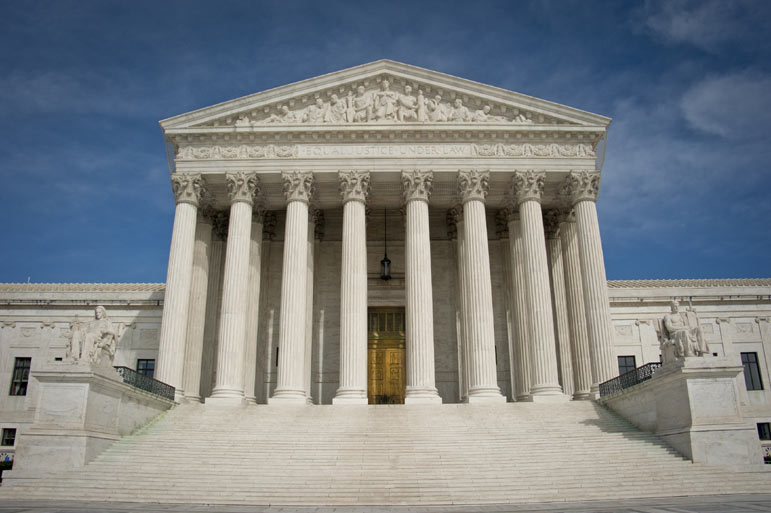
The court said that the Dodd-Frank Act of 2010 did not cover those who brought allegations only to their employers and not to the Securities and Exchange Commission.
Although some justices wondered during oral arguments whether Congress intended to draw such a distinction, Justice Ruth Bader Ginsburg wrote for her colleagues that the statute provides an "unequivocal answer" of who qualifies as a whistleblower.
" 'When a statute includes an explicit definition, we must follow that definition,' even if it varies from a term's ordinary meaning," Ginsburg wrote, quoting an earlier court precedent. "This principle resolves the question before us."
The decision was one of four issued by the court Wednesday, as the justices begin to slowly announce the outcomes of cases they have heard this term. None of the cases was among the most controversial the court has encountered, and only one - a technical case involving attorney fees for prisoners - split the court along its ideological divide. Chief Justice John Roberts was in the majority in all four.
The other cases involved a man who brought a weapon onto the U.S. Capitol grounds and a setback for families who tried to seize Persian antiquities to compensate for an act of terrorism aided by Iran.
The Dodd-Frank Act has been widely criticized by President Donald Trump, but the Department of Justice had urged the Supreme Court to take a broader view of who was covered by the act's whistleblower protections.
The Justice Department had supported Paul Somers, who was a vice president of Digital Realty Trust, a real estate investment trust that owns and develops data centers.
Somers alleged that he was fired after he told senior management that his boss hid millions of dollars in cost overruns, among other alleged violations of security laws.
Lower courts, including the U.S. Court of Appeals for the 9th Circuit, had ruled for Somers and said it did not matter that he had not also taken his claims to the SEC.
Other appeals courts read the law differently, which landed the issue at the Supreme Court.
The Justice Department argued that it would gut much of the protection provided by Dodd-Frank to apply the statute's strict whistleblower definition to the part of the law that keeps companies from retaliating against those who allege wrongdoing.
Attorneys who have represented whistleblowers before the SEC said Wednesday's ruling clearly narrowed protection.
But they also said companies might not like the result, as it could mean those alleging wrongdoing will go directly to the SEC rather than using internal procedures at their companies.
The case is Digital Realty Trust v. Somers.
The controversy involving Iran centered on a remarkable collection of antiquities housed at the University of Chicago. It consists of about 30,000 clay tablets and fragments containing ancient writings recovered during an excavation of the old city of Persepolis. In 1937, Iran lent the collection to the university for research.
Decades later, in 1997, Hamas carried out three suicide bombings in Jerusalem, resulting in five deaths and 200 injuries. U.S. citizens who were wounded in the attack or related to those injured sued in federal court in Washington, alleging that Iran was responsible because it provided material support and training to Hamas.
The plaintiffs were successful and won a judgment of more than $70 million. When Iran refused to pay, they moved to seize the collection.
But Justice Sonia Sotomayor agreed with lower courts that a federal law that generally protects foreign assets in this country did not allow the seizure. The law does provide some exceptions when the country involved provides support to extremist groups, she wrote, but doesn't allow what the plaintiffs were seeking.
The decision in Rubin v. Islamic Republic of Iran was unanimous. Justice Elena Kagan did not participate.
A majority of the court also sided with Rodney Class, a veteran from North Carolina who in 2013 parked his Jeep in a lot near the U.S. Capitol.
Inside were three lawfully owned firearms and some knives.
Class was charged with violating a prohibition on having weapons on Capitol grounds.
Class entered a guilty plea but on appeal wanted to challenge the law as a violation of his Second Amendment rights and due process, since there were no signs warning him of the weapons ban.
The question for the court was whether it was too late.
By a 6-3 vote, the court said it was not. "A defendant's guilty plea does not make irrelevant the kind of constitutional claim Class seeks to make," Justice Stephen G. Breyer wrote for the majority.
Justice Samuel Alito dissented, joined by Justices Anthony Kennedy and Clarence Thomas.
He said the court had created a "muddle" about when a plea is considered final that will "bedevil" the lower courts trying to apply it.
The case is Class v. United States.
The decision in the remaining case means that prisoners who win civil rights lawsuits will probably have to pay more of their awards to their attorneys.
At issue was whether the law required the prisoner to pay 25 percent of the award to satisfy a lawyers's fees or whether a judge could set a lower percentage up to 25 percent.
The law requires the former, Justice Neil M. Gorsuch wrote in a decision, joined by the court's other most consistent conservatives.
The case is Murphy v. Smith.


 Contact The Editor
Contact The Editor
 Articles By This Author
Articles By This Author